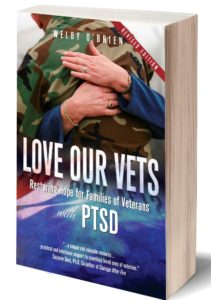In the media frenzy following the horrendous Boston Marathon bombing, I was interviewed for a press release. Although not the world’s top expert on PTSD, I gladly offered a few thoughts I have learned from my own experience living with a veteran with PTSD, as well as what I have gleaned from others. Bombs, blasts, shootings, war, and the devastation they all inflict are truly disheartening. Senseless. Sickening. But in spite of all the craziness, I firmly believe we DO have hope in the middle of the mess. ~ Welby
Here is the interview:
How does a blast or explosion or a shooting affect a person with PTSD?
Any blast can trigger a person with Posttraumatic Stress Disorder (PTSD). All human beings are susceptible to PTSD, including veterans, emergency first responders, and anyone who has experienced a severe trauma. The devastation from a bombing or shooting like this is much more severe when the individual experiences it personally (hears or sees it). And unfortunately, any news of such a horrendous act can also trigger reactive responses in those with PTSD just by sheer knowledge. How these explosions affect each person can vary greatly from anxiety and increased hyper-vigilance, to withdrawal, relationship problems, isolation, outbursts of rage, depression, sleeplessness, flashbacks, increased substance abuse and/or numbing, and even to suicidal extremes.
Does it cause an emotional outbreak? And, if so, how extreme can those outbreaks be?
The person affected by PTSD has been so traumatized that they operate 24/7 with the conscious and subconscious assumption that they may be attacked at any moment. They are continually on high alert for the trauma to happen again, even if it has been a year…or 40 years. This state of hyper-vigilance is not only mental and emotional, but also physically based. Any outbreak will involve the whole person, and of course all their loved ones too.
How should a caregiver respond to these outbreaks?
First and foremost, those who Love Our Vets, and all who care for someone with PTSD or TBI, take care of YOU. Be sure you and the children and other family members are safe. You cannot fix the PTSD but you can stay grounded and mindful of your own needs, while at the same time attempt to reassure and support the one who is traumatized.
Could a blast bring cause for your loved one to be treated differently (might they need medical help to overcome the traumatic reminder of war?)
Always encourage those with PTSD to get all the help they can. The needs of our veterans and all with PTSD are indeed unique, and they do deserve the very best! The VA offers many services, as do private counselors and support groups. (See www.LoveOurVets.org for some helpful links)
How can the caregiver prepare themselves to respond to help their vet and not to feed the fire so to speak?
In the book LOVE OUR VETS: Restoring Hope for Families of Veterans with PTSD, I have included a section called Living On Tsunami Island. I liken living with someone who has PTSD to knowing that the “tsunami” (an unexpected blast, or triggering of the profound symptoms of PTSD) can hit at any time. In that section, as well as throughout the book, I share very practical steps we can put into place for our own preparation as well as helping them.
Living with someone who has PTSD is not easy, and requires a special heart and internal stability. That is one of the reasons we started the Love Our Vets PTSD Family Support Network. As we grow in compassion, understanding and connecting, what a help it is to know we are not alone. It is truly a lifeline to find encouragement and hope from others who also walk in similar shoes. The key is to LOVE OUR VETS (and all who have PTSD) while at the same time to love ourselves. And when we learn to take good care of our needs, we have more to give, and find fulfillment in our lives and homes in spite of the PTSD.
Blasts will happen. But we can be prepared, and we will make it through as we LOVE OUR VETS and take care of ourselves.
.







